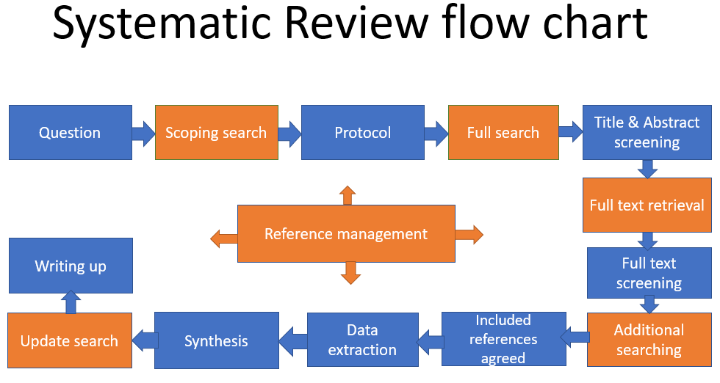Literature reviews and systematic reviews
Are you doing a full systematic review or a literature review?
Before starting your literature search, you need to be clear what you are being asked to do. Systematic reviews are carried out by PhD students and research-active staff. Undergraduates and Masters students may be asked to carry out a literature review using systematic review techniques - this will not be a full systematic review.
Below you will find descriptions of both review types.
Systematic reviews for PhD students and researchers

Literature reviews
Literature reviews are often required by undergraduate and taught postgraduate modules. You can do a comprehensive literature review or an advanced literature review or a literature search using systematic techniques using databases like Medline and CINAHL. This type of literature review needs to demonstrate that you have used appropriate search terms, and will include the structure of your search history - how and where you have searched. However, this kind of literature review differs from a systematic review in the following ways:
- It does not aim to find ALL relevant published and unpublished evidence on the specific review topic.
- It will not follow the rigorous processes of a systematic review, although it may be a carefully planned and comprehensive review.
PhD students may undertake a literature review or a systematic review as part of their studies. See the section below for more information on systematic reviews.
Systematic reviews for PhD students and research staff
"Systematic reviews aim to identify, evaluate and summarise the findings of all relevant individual studies. They adhere to a strict scientific design based on explicit, pre-specified and reproducible methods." (Centre for Reviews and Dissemination 2008, p5.)
"SLRs (systematic literature reviews) by their very definition differ from traditional literature reviews: their scope is to address a highly specific research question (e.g., 'what works' or 'what works best') for which evidence from the literature is sought. SLRs thus do not aim to provide what traditional literature reviews do: an assessment of a state of knowledge in a problem domain and identification of weaknesses and needs for further research." (Boell and Cecez-Kecmanovic 2015)
Systematic reviews follow an explicit protocol to identify ALL the available evidence on a particular research question. They are complex, high quality and rigorous reviews, which aim to:
- Identify all relevant published and unpublished evidence on the specified review topic;
- assess the quality of studies and select for inclusion;
- synthesise the findings from all of the studies in an unbiased way, in order to present a balanced summary of the findings;
- can take 18 months or longer to complete; and
- are usually carried out by three or more researchers or a research team.
University of Bradford library offers a systematic reviews advisory service for PhD students, staff and researchers undertaking full systematic review.
References
Boell SK and Cecez-Kecmanovic D (2015) On being 'systematic' in literature reviews in IS. Journal of Information Technology. 30(2): 161-173.
Centre for Reviews and Dissemination (2009) Systematic Reviews: CRD's guidance for undertaking reviews in Healthcare. https://www.york.ac.uk/media/crd/Systematic_Reviews.pdf. Accessed 14 Aug 2019.
Systematic reviews v literature reviews
The attached poster demonstrates in more detail the difference between systematic reviews and literature reviews. Kysh L (2013) What's in a Name? The difference between a Systematic Review and Literature Review and Why it Matters. University of Southern California, Norris Medical Library, MLGSCA Poster 2013 - CC-BY.
If you require this information in an alternative format, please contact our team. You can also read our Website Accessibility Statement.
Library support for systematic reviews and literature reviews
Library workshops for researchers
The Library regularly runs workshops on advanced literature searching, critical appraisal, doing your search for a systematic review, and EndNote (referencing management software). These workshops are aimed at PhD students, staff and researchers. The Library's workshop programme is available online.
You can also come along to a library skills workshop on referencing or EndNote.
Advanced literature reviews 1:1 support
Your subject librarian can advise on where and how to search for information, and how to manage your search results using referencing software. Please contact your subject librarian to get support by email or book a 30-minute appointment slot online.
Systematic reviews advisory service
University of Bradford Library do not offer a dedicated systematic review support service. We are unable to conduct systematic reviews on behalf of students, staff or research groups.
However, we do offer an advisory service for systematic reviews. The adjacent diagram highlights in orange the stages of a systematic review which the library can offer feedback and guidance on. These are:
- Scoping a search, after you have formed your question.
- Full search, after developing a search protocol.
- Full text retrieval, after title and abstract screening has been done.
- Additional searching, after full text screening has been done.
- Updating a search, after selection of references, data extraction and synthesis have taken place.
- Reference management at all stages of the process.
The Library also offers support on reference management. Please email lib-research@bradford.ac.uk to get support by email or to arrange a 1:1 appointment.

Getting started with your systematic review
Come along to our workshop on Doing your Search for a Systematic Review.
Useful links
University of Bradford reading list for systematic reviews.
The Centre for Reviews and Dissemination at the University of York have a detailed guide to undertaking systematic reviews.
CASP checklists are critical appraisal tools designed to be used when reading research, and include tools for systematic reviews.
Covidence is a tool to help with the deduplication and screening of records for relevance. The University of Bradford has a subscription to Covidence. Use the SELF-SIGN-UP link on this page and register with your University email address.
King's College London offer a detailed online guide on systematic reviews.


